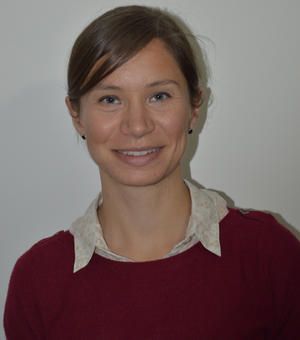Dr Rachel Wood
Research Interests:
- The application of radiocarbon to build accurate and precise chronologies which allow us to explore past people and environments, and to understand current issues in ecology and the carbon cycle
- The development of chemical preparation methods to increase the accuracy of radiocarbon analyses and expand the number of datable materials
Archaeology
As director of the Oxford Radiocarbon Accelerator Unit, I am involved in a wide variety of projects which use radiocarbon to explore past people and environments. For example, I have been involved in projects in Oxford and in my previous role in the Australian National University aiming to improve our understanding the Middle - Upper Palaeolithic of Iberia, the arrival of people in Australia and the first farmers in Vietnam.
Method development
In order to answer many of these questions accurately and precisely, new methods need to be developed. For example, the rapid degradation of organic materials in arid and tropical regions often leaves archaeologists and palaeontologists with very few viable materials for radiocarbon dating. This is a particular problem for bone, as the collagen we would normally target for dating degrades rapidly in hot climates. Bones from the tropics can rarely be dated beyond a few thousand years making the development of chronologies of e.g. cemetery sites and for the domestication of fauna exceptionally difficult. Tooth enamel is thought to be more chemically stable than bone survive for much longer in this type of environment, so I am currently attempting to understand how and why tooth enamel degrades to enable us to develop new methods to produce accurate age estimates on tooth enamel.
Forensics
Radiocarbon can be used over the last 70 years because large amounts of 14C were produced during the nuclear bomb testing in the 1960s and 70s, and caused the 'radiocarbon bomb pulse'. My interest lies in establishing if and how radiocarbon is best used to help understand and monitor the illegal trade in wildlife. Currently I have a project attempting to establish if pangolin scales can be used to work out when an animal died.
Radiocarbon as a tracer in the environment
Radiocarbon can be used to understand and quantify the cycle of carbon through the environment. For example, fossil fuels are made of plant and animal remains that are so old they contain no 14C. When carbon from fossil fuels is released into the environment or capturer, it can be identified with radiocarbon.
I am happy to supervise projects where radiocarbon dating plays a key role in the thesis, including projects developing new methodologies (including for example compound specific approaches and investigations into the impact of diagenesis) and projects applying radiocarbon dating to a wide range of archaeological and forensic questions. I am also happy to co-supervise projects where radiocarbon plays a large role in a thesis within other fields, e.g. geoscience or carbon cycle research.
Key words: chronology, earlier prehistory, later prehistory, medieval, Not period specific, Africa, Americas, Central Asia, E Asia, Eurasia, Europe, S Asia, SE Asia, Not region specific




